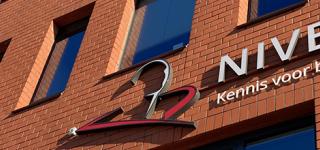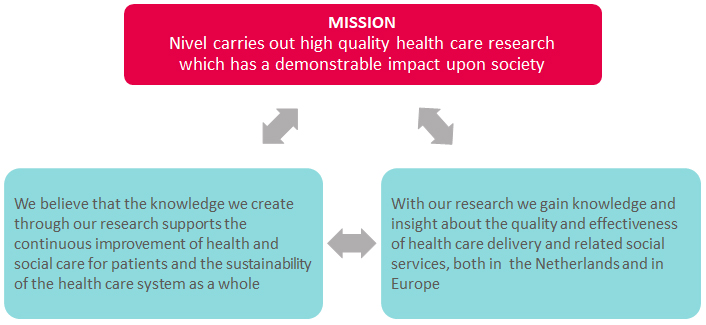
Nivel’s mission is ‘Research for better care’. How do we carry out this mission?
Nivel’s mission is ‘Research for better care’. How do we carry out this mission?
We carry out our mission ‘Research for better care’ in conducting ‘high quality health services research in the broadest sense, which has a demonstrable impact upon society'. From out this mission statement we defined our two core values:

Nivel’s expertise is available for the large and diverse group of organisations and other parties active in relevant professional areas:
Nivel has been certified to ISO-9001 standards since 1999. This means that, as an institute, we meet a number of quality requirements with regard to the core processes, the organisation, the people in the organisation and the partners. Every year, we are assessed for this through an external audit.
In 2022, the Nivel Institute was evaluated by an international, independent review committee, over the period 2016-2021. The committee assessed the scientific quality, social impact and sustainability of Nivel. In its evaluation report the committee details its findings. It also makes some recommendations for the coming years. One of the findings mentioned in the report is:
‘Nivel is a great institute with added value for science, policy and healthcare practice.’
The committee based its assessment on the Nivel Self Evaluation 2016-2021 and a series of interviews during the visitation on 22 and 23 September 2022.
Our research is based on the idea that health services research is not a linear but a continuous process of development and interaction between both the societal and the research domains:
Both policy issues and practical problems in the healthcare sector need to be translated into research questions, and the research itself has to be sensitive to problems existing in the healthcare sector.
This so-called translation is facilitated by our researchers, in consulting with policymakers and other stakeholders in order to achieve the most valid study design.
Our stakeholders determine whether the research design developed will give answers to their questions or problems (suitability). Our researchers determine whether the stakeholders’ needs are feasible.
Research conclusions, its interpretation of results and its meaning for daily practice may then lead to new policy or to an adjustment of existing policy.
New questions and/or problems automatically arise after implementation. They can then be translated into further research: step 1.
We secure the conduct of high quality research, on a scientific basis, applying the following principles:
Nivel’s research has to be performed and assessed according to the prevailing scientific standards, because the continuous process of developing and interacting (see above) only works when its underlying research products are of the highest quality. High standards of scientific research is a relevant value in its own right, but academic reputation is also important because it fosters society’s acceptance and use of the results of our research and this in turn affects the recruitment and retention of talented researchers.
Nivel’s ability to integrate its health services research with relevant societal issues - from different perspectives - makes it a unique partner in the policymaking process and a contributor to improving policy and practice in health care. Because of the high scientific quality of Nivel’s research, policymakers can reliably base their decisions on our results.
Nivel’s main view on health services research is that of a multidisciplinary field focusing on the delivery, quality, costs and access to care from the perspective of various stakeholders. Central to our approach is the interaction between patients, care professionals and organisations occupied with healthcare on the broadest sense. We study this interaction and its outcomes in relation to governance structures, meanwhile investigating characteristics of patients, care professionals and organisations.
Nivel’s activities include the collation and publication of existing knowledge and evidence in scientific, professional and policy journals, reports, bibliographies, reviews, summaries and fact sheets. Nivel has a statutory obligation to publish the results of all its activities.
Interested in exploring the options of doing research together with Nivel? Or in more information about Nivel as national research institute? Please feel free to contact us:
The coming years, next to its ‘regular’ research in the wide scope of healthcare (services), at Nivel we will focus on four 'societal challenges' we have drawn up in our Research Agenda 2022-2024. They concern society as a whole and also take up a prominent place in the sector of health and healthcare: